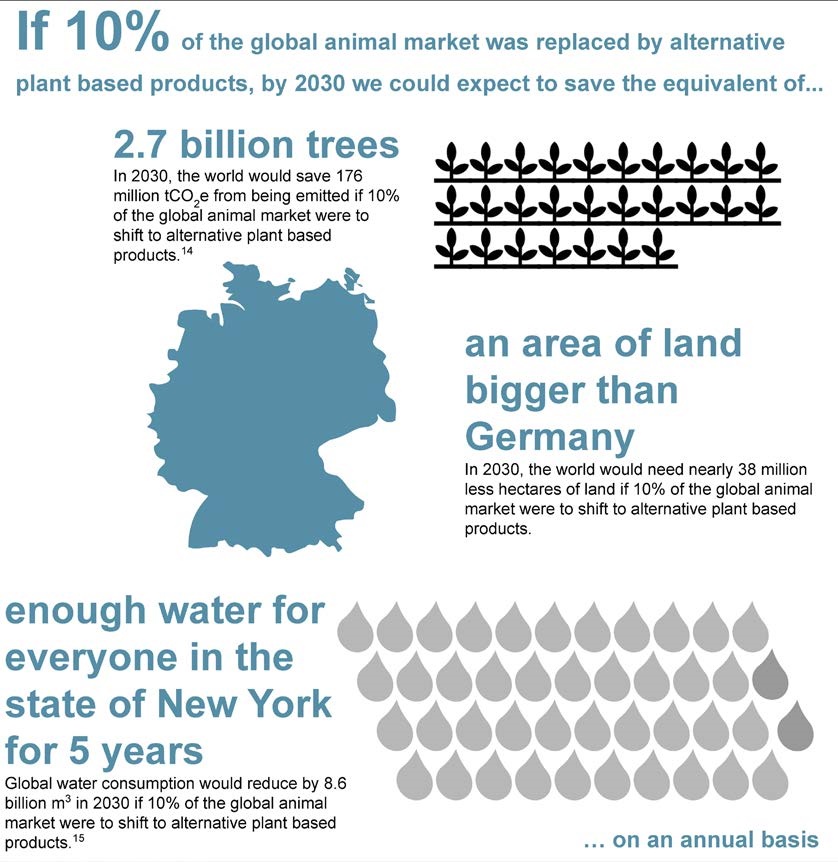By Blue Horizon
Zurich, 22 October 2020 – Global meat production and consumption increase year by year. Consumption per capita is higher than ever before. For the next decade, the growth trend is expected to continue, driven by Asia, albeit at a lower rate. The burden of meat production on the environment is massive. A comprehensive study by Blue Horizon Corporation, a pure play pioneer in the food 4.0 sector, with the support of PwC, shows for the first time the environmental impacts in a consistent framework across different meat categories, farming systems and geographies. Also, it includes the monetisation of environmental costs to show the scale of impact and enable impacts to be compared and consolidated. The analysis illustrates that plant-based alternative protein sources have a much lower environmental impact. Variation is considerable, depending on locations, systems, and cuts. The monetisation of the related costs shows a clear picture: On average, one kilo of conventionally farmed beef mince generates environmental costs of USD 7.26. This contrasts with costs of only USD 0.48 per kilo for its plant-based alternative. For pulled chicken and pork mince the gap is smaller but still significant: USD 1.66 compared to USD 0.30 per kilo for poultry and USD 0.72 versus USD 0.21 for pig meat.
Global consumption of meat reached 327 million tonnes in 2018. According to the analysis, this accounts for at least 1.7 gigatonnes CO2 emissions, occupies 380 million hectares of land and requires almost 87 billion m3 of water to produce. By looking at the potential impacts of switching away from animal products to more sustainable alternatives, the study delivers impressive facts and figures. The study finds that by 2030, with a 10% switch to plant-based alternatives, 176 million t CO2 emissions could be avoided, 38 million hectares of land could be freed and 8.6 billion m3 water saved per year. In other words: If 10% of the global animal market was replaced by alternative plant-based products, by 2030 we could expect to save CO2 emissions equivalent to 2.7 billion trees, an area of land bigger than Germany and enough water for everyone in the state of New York for five years.
The environmental footprint of plant-based alternatives has proved to be significantly lower than their animal counterparts. The strongest gap can be observed for beef mince. Here the impact of alternative protein is 15x lower than conventionally farmed beef, followed by chicken, with a 5.5x lower impact and pork at 3.4. Even for egg, the animal-based product with the lowest environmental footprint, the impact of the alternative is more than 3x lower than conventionally farmed egg. On average across the products, greenhouse gases account for around a third of the impact. Land use accounts for just over half of the environmental footprint while water consumption makes up the smallest proportion of the impact.
Björn Witte, CEO of Blue Horizon, comments: “This study provides detailed and robust information about the true price of consumption of animal proteins and their vegetable alternatives. This work is an important step in helping people to understand how the decisions we make about our protein consumption impact our environment. In addition, it enables investors to better assess the market opportunities in the food 4.0 sector.”
About the study
The study “Environmental impacts of animal and plant-based food” provides an evidence base to explore and compare the environmental impacts of both animal products and their plant-based alternatives. Globally, cattle, poultry, and pig products make up almost 95% of global meat production. Over 82 million tonnes of eggs are produced annually. The study therefore measures the environmental impacts of chicken, egg, pork, and beef production impacts across geographies and farming systems and compares these impacts to substitutes produced using plant-based protein alternatives. The focus lies on the material evaluation of environmental impacts from meat production and it does not include other factors such as air pollutants, water pollutants and waste. More on the framework and the methodology in the study which is free for download on https://www.bluehorizon.com/bhc-study-2020/
About Blue Horizon Corporation
Blue Horizon Corporation has shaped the growth of the market for alternative proteins since the beginning and accelerates it through targeted investments as a pure play industry pioneer. The company aims to sustainably transform the global food industry through investments into companies who are replacing animal proteins with healthy, alternative protein sources across the global supply chain. Blue Horizon was founded in 2016 and is based in Zurich and Los Angeles. The company launched its first venture fund in 2018. Since then, it has completed over 50 seed and venture capital investments in the alternative protein food tech sector and raised more than CHF 350 million. Its business model offers a unique market access from Seed to Consolidation via funds and direct investment platforms throughout all stages of asset lifecycles. More on www.bluehorizon.com
Media contacts
Martin Meier-Pfister, IRF
Phone +41 43 244 81 40
bluehorizon@irf-reputation.ch
Download the study for free:
https://bluehorizon.com/quantified-comparison-report/
